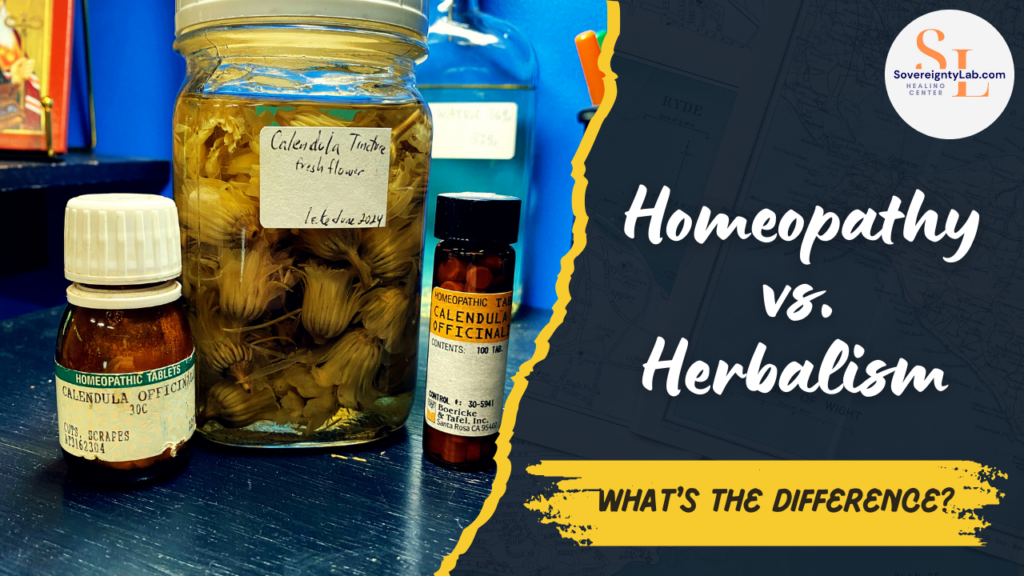
When it comes to natural remedies, there are two terms often used interchangeably by those new to holisitic health and that is homeopathy and herbalism. While both are grounded in nature’s healing power, they represent two very different systems of medicine—each with unique principles, preparation methods, and mechanisms of action. The difference between Homeopathy vs. Herbalism and understanding the major differences in each natural healing approach is key to you and your family’s success.
If you’re exploring alternative health options, understanding the major and minor differences between homeopathy and herbalism can help you choose the most suitable path for your healing journey.
What Is Herbalism?
Herbalism, also known as botanical medicine or phytotherapy, is the practice of using plants and plant extracts to support health and treat illness. It has been used for thousands of years in cultures across the world, from Traditional Chinese Medicine to Western herbal traditions.
Core Principle: The plant’s natural biochemical properties affect the body directly to stimulate healing.
Preparation: Herbal remedies are made from dried or fresh plants and come in forms such as teas, tinctures, capsules, salves, and extracts.
Example: Using turmeric to reduce inflammation, peppermint tea for indigestion or valerian for sleep.
What Is Homeopathy?
Homeopathy is a system of medicine founded in the late 18th century by Samuel Hahnemann. It is based on several key principles, the first is “like cures like,” meaning a substance that can cause symptoms in a healthy person can, in minute amounts, help cure those symptoms in a sick person. The second principle is the “law of the minimum dose”, or the idea that an extremely low or infinitesimal doses (as used in homeopathy) might produce gentle, yet effective, stimulation of the body’s self-healing mechanisms. The next foundational principle of homeopathy is the “law of similars”, meaning is the idea that a substance that causes symptoms in a healthy person can be used, in very small amounts, to treat similar symptoms in a sick person.
Core Principle: Healing comes from stimulating the body’s own vital force using highly diluted substances (extremely low doses) of substances.
Preparation: Remedies are created through a process of serial dilution and succussion (vigorous shaking). The result often contains little to no molecular trace of the original substance, but retains its energetic imprint.
Example: Using Allium cepa (red onion) in homeopathic form to treat allergy symptoms like watery eyes and sneezing—the same symptoms onion causes when cutting it.
Major Differences Between Homeopathy vs Herbalism
| Category | Herbalism | Homeopathy |
|---|---|---|
| Philosophy | Direct biochemical action on the body | Energetic stimulation of the body’s healing response |
| Dosage | Measurable amounts of plant material | Ultra-diluted doses |
| Mechanism | Acts chemically, like a drug | Acts energetically through a nuclear magnetic resonance in the body |
| Scientific Paradigm | Closer to pharmacology | Closer to quantum or energetic medicine (energy= frequency) |
| Examples | Chamomile tea for relaxation | Homeopathic Chamomilla for irritability in teething children |
Minor (but Important) Differences
- Custom vs. General Use: Herbal formulas may be more “one-size-fits-all,” while homeopathic prescriptions are often individualized down to emotional and personality traits, time of day, type of discharge and character of pain.
- Contraindications: Herbs may interact with medications or produce side effects. Homeopathic remedies rarely have contraindications or side effects, due to their ultra-dilute nature.
- Storage Sensitivity: Homeopathic remedies are sensitive to electromagnetic fields, strong odors, and direct sunlight and freezing. Herbs are generally more stable.
- Regulatory Status: Herbal products are typically regulated as dietary supplements. Homeopathic remedies have a separate regulatory path under the FDA, though oversight is evolving.
Can Homeopathy and Herbalism Work Together?
Yes—homeopathy and herbalism can complement each other beautifully when used appropriately. For example, a homeopathic remedy can support emotional or constitutional healing, while an herbal tincture offers immediate relief for symptoms like cough or insomnia.
Working with a trained Homeopathic Practitioner who understands both modalities can ensure synergy rather than conflict.
Final Thoughts
While both herbalism and homeopathy tap into nature’s wisdom, their foundations are profoundly different. Herbalism delivers measurable, physical doses of plant compounds. Homeopathy, by contrast, works on an energetic level to stimulate the body’s own capacity to heal.
If you’re deciding between natural approaches, understanding homeopathy vs herbalism gives you clarity on how each works and when to use them.
Ready to experience the difference for yourself?
Book a private Homeopathy Consultation (Online or In-Person) with Christina at Sovereignty Lab in Weaverville, NC. Whether you’re navigating chronic pain, emotional stress, or acute illness, our integrative approach supports your healing from the inside out.
